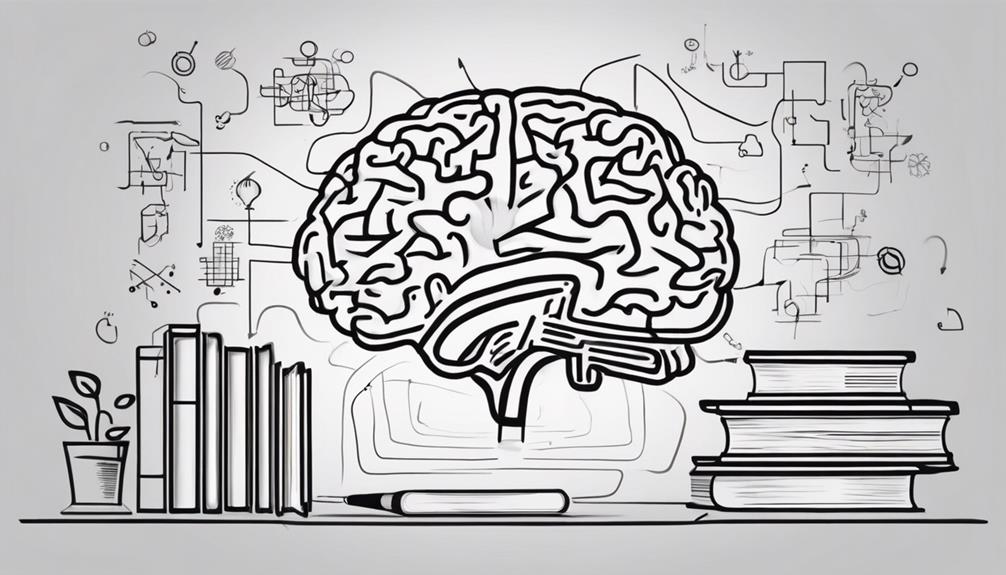The pursuit of lifelong learning holds a myriad of advantages that extend far beyond academic achievement. From cognitive stimulation to personal growth, the benefits are vast and significant. By engaging in continuous learning, individuals have the opportunity to not only enhance their skill set but also foster a sense of fulfillment and purpose. The positive impacts on mental well-being and social connections are just the beginning of the advantages that lifelong learning can offer. In exploring the multifaceted benefits, one can truly grasp the transformative power of embracing education throughout all stages of life.
Key Takeaways
- Lifelong learning enhances personal development, motivation, and growth.
- Acquiring new skills boosts career advancement and adaptability.
- Learning contributes to a healthier lifestyle and improved mental well-being.
- Lifelong learning benefits society through enhanced knowledge, skills, and social impact.
Increased Self-Motivation

Increased self-motivation is a key outcome of engaging in lifelong learning, as it propels individuals to actively seek new knowledge and skills to achieve personal growth and development. When individuals embark on a journey of continuous learning, they are driven by an internal desire to expand their understanding and capabilities. This intrinsic motivation serves as a powerful force that compels individuals to set higher learning goals and persist in overcoming challenges to attain them. By experiencing the sense of accomplishment that comes with mastering new skills or acquiring knowledge, individuals reinforce their self-motivation to further engage in the learning process.
Furthermore, self-motivation acts as a catalyst for sustaining lifelong learning habits. It instills a proactive approach to personal development, encouraging individuals to take ownership of their learning journey and seek out opportunities for growth. The drive derived from self-motivation fuels a cycle of self-improvement, where each achievement becomes a stepping stone towards continuous progress and advancement. Ultimately, increased self-motivation not only enhances the educational experience but also cultivates a mindset geared towards lifelong learning and personal enrichment.
Creating New Goals and Drives
Learning is a catalyst for personal development, triggering the creation of new objectives and aspirations. Setting specific milestones and objectives promotes continuous growth and self-improvement. Cultivating motivation and ambition through lifelong learning propels individuals towards achieving their full potential.
Setting Personal Milestones
The establishment of personal milestones serves as a pivotal catalyst in fostering new aspirations and driving individuals towards continuous self-improvement. Setting personal milestones through learning not only helps individuals create new goals and drives for self-improvement but also opens paths to new interests and objectives for personal growth. Structured learning experiences play a crucial role in setting achievable goals and milestones for continuous development. Accomplishing learning goals brings a sense of accomplishment and fulfillment, motivating individuals to pursue further challenges. Intrinsic motivation cultivated through learning is a key factor in setting and achieving personal milestones. By setting and achieving these milestones, individuals can experience a sense of progress and accomplishment, which in turn fuels their drive for lifelong learning and personal growth.
Fostering Continuous Growth
To foster continuous growth and cultivate new goals and drives, individuals must actively seek opportunities for expanding their knowledge and skills through structured learning experiences. This process not only enhances personal development but also contributes to mental well-being. Here are four key ways in which fostering continuous growth can positively impact individuals:
- Opening Paths to Discovering New Goals: Learning about new subjects can spark interests and lead to the exploration of new aspirations.
- Setting Ambitious Targets: Acquiring new skills and knowledge often inspires individuals to set ambitious targets for their personal growth.
- Establishing Clear Goals: Structured learning environments help individuals define clear goals and objectives for their educational journey.
- Instilling a Sense of Achievement: Accomplishing learning milestones can boost self-esteem, motivation, and mental well-being.
Cultivating Motivation and Ambition
Cultivating motivation and ambition is essential for individuals seeking to create new goals and drives that propel them towards personal growth and success. Learning about new subjects can lead to the development of new interests and ambitions, while acquiring knowledge in specific areas can open up paths to set and achieve new goals. Structured learning programs play a vital role in helping individuals define their aspirations and drives. Accomplishing educational goals not only brings a sense of fulfillment but also serves as a source of motivation for further learning. Intrinsic motivation, stemming from personal satisfaction and curiosity, is a key factor in sustaining lifelong learning and fostering continuous personal growth.
| Learning Benefits | Motivation Factors |
|---|---|
| New interests and ambitions | Personal fulfillment and drive |
| Pathways to set and achieve new goals | Intrinsic motivation |
| Structured programs for defining aspirations | Continued personal growth and success |
Greater Self-Confidence
Engaging in lifelong learning cultivates a stronger sense of self-confidence through the acquisition of new skills and knowledge. This newfound expertise not only enhances personal growth but also opens doors to various career advancement opportunities. Ultimately, the continuous pursuit of learning serves as a cornerstone for building and reinforcing self-assurance in individuals.
Improved Skills and Knowledge
Continuous engagement in lifelong learning not only enhances individuals' skills and knowledge but also significantly elevates their self-confidence levels. Acquiring new skills through ongoing education leads to a deepening sense of self-confidence and belief in one's abilities. This boost in self-confidence is a direct result of the increased knowledge and competencies gained from lifelong learning. Moreover, mastering new subjects or areas of expertise through continuous learning instills a sense of accomplishment and self-belief. Through the journey of lifelong learning, individuals not only expand their skill set but also build a strong foundation of self-assurance that positively impacts their personal and professional growth.
Enhanced Personal Growth
The process of lifelong learning not only enriches individuals' skill sets and knowledge but also plays a crucial role in fostering enhanced personal growth, particularly in bolstering self-confidence through the acquisition of new expertise and abilities. Gaining competence in various areas through continuous learning can significantly impact self-confidence levels and overall well-being. Here is a table highlighting the relationship between lifelong learning and self-confidence:
| Lifelong Learning and Self-Confidence |
|---|
| Enhances personal growth |
| Boosts self-confidence |
| Overcomes challenges |
| Reinforces positive self-image |
| Elevates overall well-being |
Through the pursuit of knowledge and skills, individuals can develop a greater sense of self-worth and belief in their abilities, ultimately leading to improved self-confidence and personal development.
Career Advancement Opportunities
In the realm of professional development, the correlation between lifelong learning and career advancement opportunities is undeniably strengthened by the cultivation of greater self-confidence. Lifelong learning plays a pivotal role in enhancing career prospects by boosting self-assurance through the acquisition of new skills and knowledge. Here are four ways in which lifelong learning fosters career advancement opportunities:
- Skill Acquisition: Lifelong learning equips individuals with the necessary skills to excel in their fields.
- Opportunity Expansion: Acquiring new skills opens up doors for career advancement and progression.
- Self-Esteem Boost: Continuous learning enhances self-esteem, enabling individuals to tackle challenges with confidence.
- Expertise Development: Developing expertise through lifelong learning enhances self-confidence in navigating career growth and seizing opportunities.
Learning Practical Skills
Through lifelong learning, individuals can develop practical skills essential for problem-solving and critical thinking. Acquiring these skills not only enhances one's ability to apply knowledge in real-life situations but also improves performance in personal and professional settings. Lifelong learning fosters the development of hands-on skills that are valuable in various industries and career paths. The application of these practical skills acquired through continuous learning can lead to increased efficiency and effectiveness in daily tasks.
—
| Practical Skills | Benefits |
|---|---|
| Problem-solving | Enhances critical thinking abilities |
| Critical thinking | Improves decision-making skills |
| Hands-on skills | Increases adaptability in dynamic environments |
| Application of knowledge | Enhances problem-solving capabilities |
| Efficiency | Boosts productivity levels |
—
Learning for the Sake of Enjoyment

Engaging in lifelong learning purely for enjoyment offers individuals the opportunity to explore diverse subjects without the constraints of specific objectives. This type of learning allows for the pursuit of knowledge driven by curiosity and personal interest, fostering a sense of joy in the continuous discovery of new information. Learning for the sake of enjoyment can contribute to personal growth, encouraging individuals to expand their horizons and find fulfillment in the process of acquiring knowledge.
Personal Growth Through Learning
Indulging in the pursuit of knowledge solely for the joy it brings can significantly enrich one's personal development and cognitive abilities. Learning for enjoyment is a valuable endeavor that goes beyond the acquisition of practical skills. Here are ways in which personal growth can be enhanced through this form of learning:
- Broadened Perspectives: Exploring diverse subjects fosters open-mindedness and empathy.
- Enhanced Critical Thinking: Engaging in intellectual pursuits sharpens analytical skills.
- Boosted Creativity: Learning for pleasure stimulates innovative thinking and problem-solving.
- Emotional Well-being: Enjoying the process of gaining knowledge can lead to increased satisfaction and overall happiness.
Curiosity-Driven Pursuit of Knowledge
A fundamental aspect of intellectual development lies in the pursuit of knowledge driven by curiosity, characterized by a genuine thirst for understanding and exploration. Curiosity-driven pursuit of knowledge involves the exploration of topics purely for the joy of learning and discovery, without the need for practical applications. Individuals who engage in lifelong learning for the sake of enjoyment seek to expand their intellectual horizons and satisfy their curiosity. This form of learning allows individuals to delve into diverse subjects without specific goals or outcomes in mind, fostering a deep sense of fulfillment and satisfaction from the ongoing pursuit of knowledge. The intrinsic motivation derived from curiosity-driven learning propels individuals to continuously seek out new information and experiences, contributing to their personal growth and intellectual enrichment.
Joy in Continuous Discovery
The pursuit of knowledge driven by curiosity is not only a fundamental aspect of intellectual development but also serves as a beacon guiding individuals towards the everlasting joy found in continuous discovery for the sake of enjoyment. Engaging in lifelong learning purely for pleasure and personal growth offers individuals a pathway to explore new topics and subjects without the pressure of specific goals. This joy in continuous discovery can bring fulfillment and satisfaction through activities that stimulate curiosity and creativity. By embarking on this journey of learning for enjoyment, individuals open themselves up to a world of intellectual stimulation that fosters personal growth and enrichment. Through hobbies, interests, and pure curiosity, a life of continuous discovery can lead to a more fulfilling and enriched existence.
- Exploring new topics without pressure
- Finding fulfillment and satisfaction
- Stimulating curiosity and creativity
- Fostering personal growth and enrichment
Sharpening Your Mind

Engaging in a lifelong learning practice provides a powerful mechanism for enhancing cognitive function and mental acuity through continuous mental stimulation and challenges. By acquiring new knowledge and skills, individuals exercise various areas of their brain, ultimately improving cognitive function. Regular mental exercises associated with lifelong learning have been shown to reduce the risk of cognitive decline and enhance memory retention. Furthermore, engaging in challenging learning activities promotes neuroplasticity, enabling the brain to adapt and grow in response to new information.
In addition to these benefits, lifelong learning plays a crucial role in enhancing problem-solving skills, critical thinking abilities, and overall mental agility. The continuous pursuit of knowledge and exposure to new ideas stimulate the brain, leading to improved cognitive functions. Therefore, individuals who embrace lifelong learning not only expand their knowledge base but also sharpen their minds, promoting cognitive health and well-being throughout their lives.
Investing in Health
Engaging in lifelong learning not only enriches the mind but also plays a crucial role in investing in one's health. By making healthier lifestyle choices, individuals can experience improved mental well-being and enjoy increased longevity benefits. This holistic approach to learning not only nurtures the intellect but also fosters a healthier and more fulfilling life.
Healthier Lifestyle Choices
By fostering a culture of continuous learning, individuals can actively engage in shaping their healthier lifestyle choices through a deeper understanding of nutrition, exercise, and preventive healthcare measures. This engagement promotes better physical and mental well-being by enabling informed decisions and proactive health management. Here are key ways lifelong learning contributes to healthier lifestyle choices:
- Nutrition Awareness: Learning about balanced diets and proper food choices enhances overall health and vitality.
- Exercise Education: Understanding the importance of physical activity leads to increased fitness levels and reduced risk of chronic diseases.
- Preventive Healthcare Knowledge: Knowledge of preventive measures enables early detection and intervention for potential health issues.
- Stress Management Techniques: Learning stress coping mechanisms improves mental health and contributes to a more balanced lifestyle.
Improved Mental Well-Being
Investing in health through lifelong learning is a proven strategy to enhance mental well-being and overall quality of life. Lifelong learning plays a crucial role in reducing the risk of cognitive and memory decline. Continuous education activities have been linked to improved cognitive abilities, self-esteem, and confidence levels. Acquiring new skills and knowledge through learning helps individuals become more adaptable to change and enhances problem-solving skills. Moreover, engaging in lifelong learning activities can contribute to maintaining a positive mindset, reducing stress levels, and promoting better mental health. By prioritizing lifelong learning as a part of a healthy lifestyle, individuals can experience significant improvements in their mental well-being, leading to a higher quality of life and overall well-being.
Increased Longevity Benefits
Lifelong learning has demonstrated a significant correlation with increased longevity, supported by research indicating that individuals who actively pursue continuous education tend to enjoy a longer lifespan. Engaging in learning activities can help your brain in various ways:
- Acquiring new skills reduces the risk of chronic diseases.
- Regular mental stimulation boosts brain health and cognitive function.
- Learning new things throughout life lowers stress levels.
- Investing in lifelong learning improves physical well-being and promotes a longer, more active lifestyle.
Participating in Existing Interests
Through the pursuit of lifelong learning, individuals can actively engage in their existing interests to cultivate new skills and knowledge in familiar domains. By delving deeper into hobbies or passions, individuals can enhance their creative pursuits and elevate their expertise. This continuous exploration and expansion of existing interests not only enrich lives but also provide a sense of personal growth and accomplishment.
Participating in lifelong learning within existing interests promotes constant self-improvement and skill development. Acquiring new knowledge in familiar areas allows individuals to stay current and relevant in their fields of interest. Moreover, it opens doors to innovative approaches and fresh perspectives within those domains. This ongoing learning process not only sharpens existing skills but also encourages individuals to push boundaries and discover new possibilities within their areas of expertise.
Ultimately, engaging in lifelong learning through existing interests is a rewarding journey that fuels personal development, nurtures creativity, and fosters a deeper connection with one's passions.
Discovering New Interests

Exploring unfamiliar subjects and disciplines through continuous learning endeavors can unveil hidden interests and passions that significantly enhance individuals' personal growth and fulfillment. When individuals engage in lifelong learning with an open mind, they open themselves up to a world of possibilities, leading to the discovery of new interests. This process can be transformative, offering a sense of excitement and purpose. Here are four ways in which discovering new interests through learning can positively impact individuals:
- Broadening Horizons: Delving into diverse subjects exposes individuals to new ideas and perspectives, expanding their worldview.
- Enhancing Creativity: Discovering new interests can spark creativity and innovation, providing fresh outlets for self-expression.
- Boosting Self-Confidence: Mastering a new skill or subject instills a sense of accomplishment, boosting self-esteem and confidence.
- Fostering Social Connections: Shared interests can bring people together, fostering new relationships and networks based on common passions.
Through the journey of lifelong learning, individuals can continuously evolve and enrich their lives by discovering new interests that resonate with their inner selves.
Innovative Problem-Solving Skills
Enhancing problem-solving acumen through continuous learning nurtures individuals' capacity to devise innovative solutions by fostering a mindset inclined towards creative thinking and exploration. Lifelong learning plays a crucial role in equipping individuals with new skills that enable them to adapt to evolving challenges. Research indicates that those who prioritize continuous learning exhibit heightened levels of critical thinking and problem-solving capabilities, essential for tackling complex issues effectively. By acquiring new knowledge and skills, individuals broaden their problem-solving toolkit, allowing them to approach problems from various perspectives and develop unique solutions. Furthermore, the practice of lifelong learning cultivates curiosity and a willingness to experiment, both essential traits for fostering innovative problem-solving skills. Engaging in continuous learning not only enhances individuals' ability to navigate challenges but also empowers them to think innovatively and creatively when faced with obstacles, making it a valuable asset in an ever-changing world.
Job Security and Adaptability

The cultivation of job security and adaptability through lifelong learning is pivotal in ensuring individuals remain resilient and valuable assets in a dynamic and competitive workforce. Lifelong learning provides a foundation for individuals to enhance their job security and adaptability through the acquisition of new skills. Here are four ways in which lifelong learning contributes to job security and adaptability:
- Enhanced Knowledge and Skills: Lifelong learning equips individuals with the latest industry knowledge and skills, making them more valuable and less likely to face job insecurity.
- Improved Adaptability: Acquiring new skills through continuous learning enables individuals to easily adjust to evolving job requirements and market demands, enhancing their ability to thrive in changing environments.
- Relevance in Careers: Continuous learning ensures individuals stay relevant in their careers, reducing the risk of job displacement due to technological advancements or industry shifts.
- Career Advancement Opportunities: The adaptability gained through lifelong learning allows individuals to take on new roles and responsibilities, expanding their career opportunities and potential for advancement.
Building a Diverse Network
Through lifelong learning, individuals can expand their professional circles and enhance their opportunities for collaboration by building a diverse network. Meeting others from different backgrounds and industries can lead to increased opportunities for collaboration and provide valuable insights and knowledge. A diverse network offers support, mentorship, and connections that can enhance personal and professional growth. Interacting with a variety of people can spark creativity, innovation, and unique problem-solving approaches. Cultivating a diverse network through lifelong learning can open doors to new career opportunities and enriching experiences.
| Benefits of Building a Diverse Network | ||
|---|---|---|
| Increased collaboration opportunities | Valuable insights and knowledge | Support, mentorship, and connections for growth |
| Spark creativity, innovation, and unique problem-solving | Open doors to new career opportunities and enriching experiences |
Enhancing Teaching Abilities

Expanding one's knowledge through lifelong learning not only cultivates a diverse network but also plays a pivotal role in enhancing teaching abilities. Professional development opportunities in lifelong learning offer teachers a platform to refine their skills and stay abreast of the latest advancements in education. Here are key ways in which lifelong learning enhances teaching abilities:
- Keeping Abreast of Educational Trends: Lifelong learning ensures educators are updated with the latest teaching methodologies and technological advancements, aiding in the delivery of high-quality education.
- Adapting to Diverse Student Needs: Continuous learning equips teachers with the tools to cater to a variety of learning styles and individual student requirements effectively.
- Creating Innovative Lesson Plans: Acquiring new skills through professional development enables teachers to design engaging and creative lesson plans that resonate with their students.
- Improving Classroom Management: Professional development opportunities empower educators to enhance their classroom management techniques, fostering a conducive learning environment for students.
Through lifelong learning, teachers can refine their teaching abilities, ultimately leading to improved student outcomes and a more enriching educational experience.
Contributing to Society
By engaging in lifelong learning, individuals actively contribute to the advancement and betterment of society through their enhanced knowledge and skills. Lifelong learners continually acquire new skills and knowledge, which enables them to tackle complex societal issues and contribute meaningfully to their communities. As they stay abreast of current developments and advancements in various fields, they are better equipped to propose innovative solutions that can address pressing challenges faced by society.
Moreover, lifelong learners often engage in volunteer work, mentorship programs, and community initiatives. These activities not only enhance social cohesion and support systems but also provide opportunities for individuals to apply their new skills in real-world settings. Furthermore, the broader perspective on social issues gained through continuous learning motivates lifelong learners to participate in civic engagement and advocacy efforts, leading to positive changes within society.
In essence, lifelong learning plays a crucial role in fostering a more informed, skilled, and socially conscious population that actively contributes to the progress and well-being of society.
Finding New Life Meaning

Engagement in lifelong learning facilitates the discovery of new life meaning through the exploration of diverse passions and interests. This exploration leads to a deeper understanding of oneself and the world, opening up avenues for personal growth and self-discovery. Here are four ways in which finding new passion through learning can bring meaning to one's life:
- Sense of Purpose: Discovering new passions can provide individuals with a clear sense of purpose and direction in life, guiding their actions and decisions towards fulfillment.
- Self-Reflection: Exploring different areas of knowledge prompts individuals to reflect on their values, beliefs, and goals, leading to a better understanding of themselves.
- Personal Growth: Acquiring new skills and expertise through learning fosters personal growth, empowering individuals to overcome challenges and embrace new opportunities.
- Renewed Motivation: Finding new meaning in life through learning ignites a renewed motivation to pursue aspirations and dreams, fueling creativity and innovation in various aspects of life.
Frequently Asked Questions
What Is Lifelong Learning and Its Benefits?
Lifelong learning is the pursuit of continuous growth through education and skill development throughout one's life. It enables individuals to adapt to evolving societal and professional demands, fostering personal enrichment and career advancement. This process of ongoing intellectual and personal development elevates individuals' cognitive abilities, social connections, and overall well-being. Embracing lifelong learning empowers individuals to remain agile, innovative, and competitive in an ever-changing world.
What Is the Goal of Lifelong Learning?
The primary aim of lifelong learning is to foster continuous growth through the acquisition of new knowledge, skills, and experiences throughout an individual's lifetime. By embracing a mindset of perpetual development, individuals can adapt to a rapidly evolving world, enhance personal and professional capabilities, and remain intellectually engaged. This dedication to ongoing learning enables individuals to stay relevant in a dynamic job market, cultivate curiosity, and navigate new challenges with adaptability and resilience.
Which Factor Is a Benefit of Lifelong Learning?
Continuous growth is a fundamental benefit of lifelong learning. Engaging in ongoing education and skill development allows individuals to expand their knowledge base, adapt to changing environments, and stay relevant in their fields. This process fosters personal development, encourages intellectual curiosity, and promotes a proactive approach to self-improvement. By embracing lifelong learning, individuals can experience continuous growth in various aspects of their lives, ultimately leading to a more fulfilling and enriched existence.
How Does Lifelong Learning Help Most People?
Continuous growth through lifelong learning is a cornerstone for most individuals seeking personal and professional development. This journey enables individuals to expand their knowledge, skills, and perspectives, leading to enhanced career opportunities, cognitive abilities, and social connections. Lifelong learning acts as a catalyst for personal growth, fostering overall well-being and competitiveness in the job market. Through this process, individuals experience a profound transformation that positively impacts various facets of their lives.
Conclusion
In conclusion, lifelong learning offers numerous benefits that contribute to personal growth and well-being. One interesting statistic to note is that individuals who engage in continuous learning are 47% more likely to have higher job satisfaction and career advancement opportunities. By continuously acquiring new skills and knowledge, individuals can enhance their self-motivation, confidence, and overall quality of life. Embracing lifelong learning is essential for personal development and success in today's rapidly changing world.
